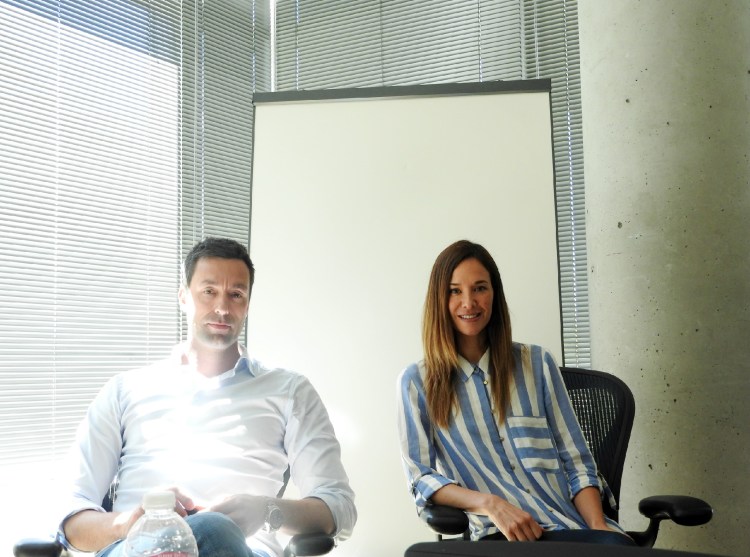GamesBeat: There are interesting signs of creative things here, smaller things. The golf game was pretty crazy. We have women in FIFA now. We have Unravel. These are things we wouldn’t have always expected EA to do. Is that the kind of thing you want to see more of?
Soderlund: We made the decision to put women in FIFA. To me it was just obvious. I have two girls who both play soccer. They asked me, “Why can’t we play women in the game?” “I don’t know. That’s a good idea. We should fix that.” I’m with Jade here. We need women in the game industry because we need diversity. We need input from different people and different cultures.
If you come to Sweden, every single meeting at our studios is held in English. All the communication is written in English. 30 or 40 percent of our employees are not Swedish speakers. They’re from everywhere. Diversity, both gender-wise and ethnically, is key. It just makes the work better.
For us as a company, how creative we are is about doing the things that we believe in. Having women in FIFA — people look at it and act as if it’s controversial. It’s not. It’s completely natural. Why wouldn’t we have women in FIFA? We’re just doing things we want to do. To me, Unravel is another example. Unravel stems from a desire to build something new and support something we believe is not only a good game, but also a beautiful little tale told by a great team. Same with Motive and what Jade’s doing. It’s taking some of the funds we have an investing in different things.
I look at EA Studios and we’re almost like portfolio managers. We have certain things generating money, whether it’s FIFA or Battlefield or something else. We have up and coming games like Mass Effect and Dragon Age. But we have to take those things and say, let’s reinvest some of that into new things. Whether that’s an indie developer from northern Sweden or a new studio in Montreal or some other way of doing it, they’re all viable options. Doing that will give us, hopefully, a breadth to our portfolio. We’ll be seen as people who want to do something different. We’ll be seen, hopefully, as a company that pushes the industry forward.
We have a responsibility, as one of the biggest publishers and game developers in the world, to help push this industry forward. The only way to do that is to push ourselves creatively. Whether it’s a sequel, a new IP, or an external partners, we need to make sure we do all we can.
Part of why we had this discussion today — a lot of people still look at EA and say, “They’re all about the money.” We’re not. The fact that we’re in a position where we do make money allows us to invest in other things. That’s a way for us to push the industry forward. That’s my mantra, something I’ll do everything I can to push. So far EA seems to like that. The day they don’t like it they’ll find someone else who gives the company a different direction.
GamesBeat: Does Hardline now fall under your oversight?
Raymond: Yes, it does.
GamesBeat: Did you have a particular postmortem on that game and how it turned out? It seemed to get good reviews, but not great ones.
Soderlund: That’s fair. Hardline is absolutely a successful product for us. No doubt about that. It was a bet we made. We believe in the bet. The team has done a good job. It’s selling well. But as with any creative process — this is an industry where you have to understand, with the portfolio approach, that not everything you do will sell 25 million units. That’s how it is.
I’m not suggesting we’re not happy with the performance of the game. As a whole, Hardline has been a good experience for us. It’s helped that team become familiar with the Frostbite engine and reach fidelity levels they previously couldn’t get to. You look at this from so many perspectives when you run an organization. Will we do more Hardlines in the future? Who knows? But for now we remain happy with it.
Raymond: I think it’s a brand that has potential, personally. What’s exciting to me is that there’s still a significant community of people playing it. We’re coming out with expansion pack two, with a whole new mode for heists. The fans were excited when it was shown at Cologne. It has a big community of players who are having a good time and the team is still creating new content to support that community. It’s great, for me coming in from the outside, to see that kind of dedication to the community. There are people down there watching what the community says and continuing to tune the experience in the game.
GamesBeat: Do you have to figure out how to encourage that team to go up to another level on their next project?
Raymond: They’re super passionate. They don’t need any more encouragement. Every day they play what they’re working on. They don’t just play it because that’s a best practice and they want to make sure they’re seeing the new stuff. They play it because they love playing the game every day at 4PM. I’m going to go play with them today. But yeah, they do not need encouragement.
GamesBeat: Do you have any closing comments?
Raymond: I’d love to talk to you in a few months when we have more details to talk about as far as Star Wars and we’ve gotten the initial stuff for the new IP. But from my perspective, this is a huge opportunity. We’re going to be able to make an impact.
VentureBeat's mission is to be a digital town square for technical decision-makers to gain knowledge about transformative enterprise technology and transact. Learn More




